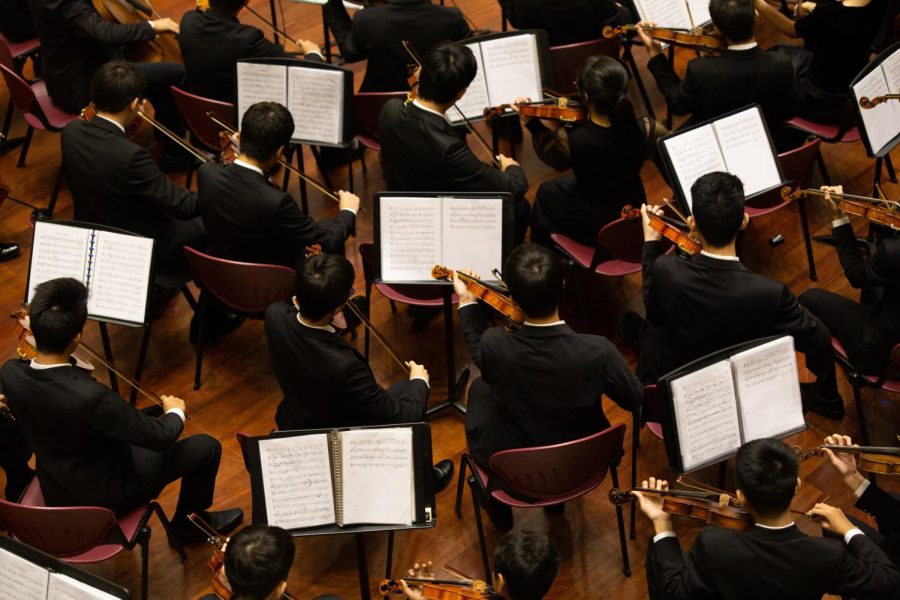Make Music Classes a Graduation Requirement
October 10, 2022
Music: an extraordinary breed of art in the form of instrumental sounds and rhythms that indirectly expresses the beauty of one’s emotions through different tones, melodies, and harmonies. Thanks to music, people are able to strengthen the connection between their logical and creative sides, respectively known as the left and right lobes of the human brain. Research has shown that being able to play at least one musical instrument is highly beneficial for the stimulation of brain cells, especially those of high school students since it is extremely important for their minds to continuously grow and expand in accordance with new knowledge gained. Therefore, I strongly believe that music classes should become a graduation requirement for all high school students.
Having said that, many students fail to recognize the potential of being able to play a musical instrument. Many think that it’s a pointless activity to spend time on when instead, the process of learning the instrument can truly be useful in the development and improvement of their brain, which can eventually help them do well in their studies. Making music classes a graduation requirement can encourage them to learn how to play instruments so that they can maximize their capabilities in academic achievement.
Learning a musical instrument is like learning simple math; it’s all about understanding the basics before moving on to a higher level. Thus, learning about the instrument and becoming familiar with its functions is the most crucial step in playing. From there, these fundamental skills will be built upon and honed to perfection. More specifically, as people continue to learn and play musical instruments, their minds will develop muscle memory that will then enhance their overall brain power. This newly acquired brain power is a significant quality to have as a student since it is able to help one learn at a more efficient rate.
The learning of an instrument brings about many principal values that all people can eventually exercise on a daily basis. Reading music sheets, for example, is essential in order to be able to play any instrument. Comprehending those papers filled with bars and notes can boost our analytical skills in the sense that it requires us to examine the fine details of the sheet music as a means to understand and employ the necessary skills to achieve the correct tune and tempo of the piece so that it can be played as intended. The ability gained from reading musical notations aids in enhancing brain development in children, ultimately giving them the advantage of performing well academically.
Fine motor skills can also be obtained from participating in musical settings. For instance, playing the piano, violin, or guitar is an excellent way to improve our hand-eye coordination abilities as it helps us focus simultaneously on our left and right hands as well as each of our fingers. These abilities play a huge role in all students’ lives since poor coordination skills may greatly affect their attention span in class. Furthermore, sharpening these motor skills might have a direct role in helping students focus in a particular subject, such as math.
An analysis by Martin Guhn, Scott D. Emerson, and Peter Gouzouasis states that “highly engaged instrumental music students were, on average, academically over one year ahead of their peers.” The analysts found that engagement in music benefits high school academic achievement since being able to play instruments promotes critical thinking skills in young, easily influenced minds as well as memorization and coordination abilities, all of which are vital in doing well academically.
As far as graduation requirements go, a music class should be a more specific requirement instead of having it under the general Visual and Performing Arts category as it focuses more so on the field of musical theory rather than a broad form of art. However, having a music class take a spot in students’ schedules would mean fewer freedom in choosing other elective classes. That being said, students wouldn’t only be taking music classes for the sake of obtaining subject credits, but more to the fact that educating themselves in the musical field may also assist them in performing well in their other classes, making this a win-win situation.
Taking all of this into account, it can be concluded that it’s best to add music classes to the list of high school graduation requirements; by implementing music classes, it enables students to become more musically in-tune and allows them to improve certain motor skills for academic purposes as well.
Photo courtesy of UNSPLASH.com

